非谓语动词难点、易错点(2)
非谓语动词难点、易错点

elected president is having a hard time.
With a lot of difficult problems __A___, the newly-
elected president felt relaxed.
A. settled
B. settling
C. to settle
独立主格结
构中,
现在分词
名 过去分词
词 不定式
+ ()
代 词
形容词 副词
介词短语
非谓语动词
的形式错误
A. follows
B. followed
C. to follow D. being followed
②----What the young man did is really worth
praising.
A. Having expected
B. Expect
C. To expect
D. Expecting
第一步:辨别谓语“是与非 ” 一个句子如果没有连接词、引导词,那么只能有一个谓语动词。 寻找动词,根据时态结构判断谓语和非谓语(注意标点符号)
第二步:考虑习惯搭配
第三步:确定非谓语的逻辑主语,判断语态
The problem__A__ just now is of great importance.
A. discussed
B. being discussed
C. to be discussed
2) With a lot of difficult problems __C___, the newly-
---- I agree, and he has received a lot of letters of
高考英语一轮复习语法讲解非谓语动词(二)

三、过去分词的用法
• 1.过去分词作定语: • Our class went on an organized trip last Monday. • 上周一我们班开展了一次有组织的旅行。Those
selected as committee members will attend the meeting. • 当选为委员的人将出席这次会。 • 2.过去分词作表语: • The window is broken. 窗户破了。 • They were frightened at the sad sight. • 他们对眼前悲惨的景象感到很害怕。
谈话的那个人是我们班长的父亲。
• 5.作同位语: • His habit,listening to the news on the radio remains unchanged.他
收听收音机新闻节目的习惯仍未改变。
• 6.作宾语补足语:如下动词后可跟现在分词 作宾语补足语:
• see,watch,hear,feel,find,get,keep,notice,obse rve,listen to,look at,leave,catch等。
• ⑤作结果状语: • He dropped the glass,breaking it into pieces.
他把杯子掉了,结果摔得粉碎。 • ⑥作目的状语: • He went swimming the other day. 几天前他
去游泳了。 • ⑦作让步状语: • Though raining heavily,it cleared up very
• The present situation is inspiring. • 当前的形势鼓舞人心。
• 3.作宾语:
非谓语动词使用时容易出错的几个问题

非谓语动词使用时容易出错的几个问题安徽崔怀金一、非谓语动词与时态的关系英语中的动词既有能在句子中单独作谓语的实义动词(又称行为动词),还有要与其它动词一起作谓语的连系动词、助动词及情态动词。
非谓语动词在英语语法概念中不是一个独立的范畴,它属于动词词形,在形式上和谓语动词相似,它几乎可以作除动词之外的任何成份,但就是不能作谓语,故称为非谓语动词。
谓语动词主要通过各种动词时态,体现出其动词特征。
而非谓语动词所体现的是与逻辑主语及谓语动词之间所形成的联系。
非谓语动词包括三个方面的内容:-ing分词,过去分词和动词不定式。
在实际的解题过程中,究竟是谓语动词还是非谓语动词是许多同学感到头疼的一个问题,在解非谓语动词的题目时总是与谓语动词等同起来,摆脱不了时态的思维定势。
下面以高考题为例,分析它们之间的易混之处。
1)The wild flowers looked like a soft orange blanket ______ the desert. (2006年湖南21)A. coveringB. coveredC. coverD. to cover不少学生易选B,正是受谓语动词looked是过去时态的影响,但此句是个单句,已有谓语动词,再出现动词时不能再作谓语,即不能用时态来考量该动词。
此时的动词要受其逻辑主语及谓语动词的结构影响:此处cover与blanket有主动关系,故用-ing形式表主动。
2)There have been several new events ______ to the program for the 2008 Beijing Olympic Games. (2006年北京28)A. addB. to addC. addingD. added同样,此题中have been是谓语动词,决定了此句中不能再有另外的谓语。
动词add只能作非谓语动词来使用。
由于它与逻辑主语several new events之间存在有被动关系,故只能用D。
高考英语非谓语动词重点和解题方法(2)
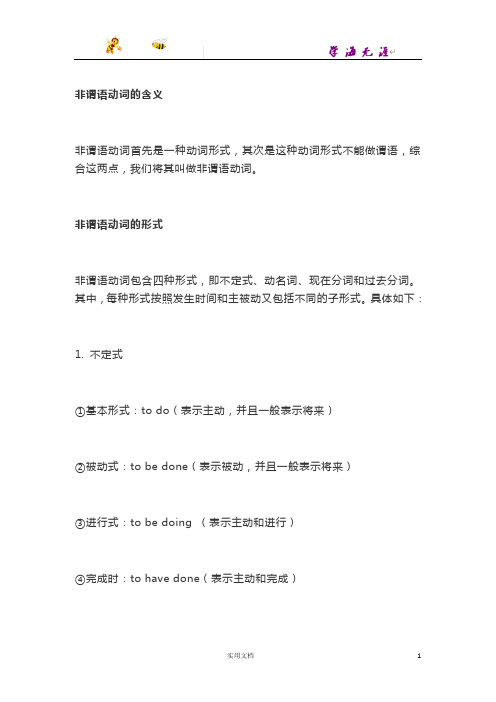
非谓语动词的含义非谓语动词首先是一种动词形式,其次是这种动词形式不能做谓语,综合这两点,我们将其叫做非谓语动词。
非谓语动词的形式非谓语动词包含四种形式,即不定式、动名词、现在分词和过去分词。
其中,每种形式按照发生时间和主被动又包括不同的子形式。
具体如下:1. 不定式①基本形式:to do(表示主动,并且一般表示将来)②被动式:to be done(表示被动,并且一般表示将来)③进行式:to be doing (表示主动和进行)④完成时:to have done(表示主动和完成)⑤完成被动式:to have been done(表示被动和完成)⑥完成进行式:to have been doing (表示主动和完成进行)The teacher told us to do morning exercises. 老师让我们做早操。
The car to be bought is for his sister. 要买的这辆车是给他的姐姐的。
She pretended to be reading when the teacher came into the classroom. 老师进来时,她假装正在读书。
The thief is said to have escaped. 据说小偷已经逃跑了。
The thief is said to have been arrested. 据说小偷已经被抓住了。
She is said to have been working in the factory over the last 20 years. 据说在过去的20年里,她一直在这家工厂工作。
2. 动名词①基本形式:doing (表示主动)②被动式:being done(表示被动)③完成式:having done(表示主动和完成)④完成被动式:having been done(表示被动和完成)Travelling in space by ordinary people will be common in the future. 在未来,普通人在太空旅行将会是普遍的事情。
非谓语动词的难点
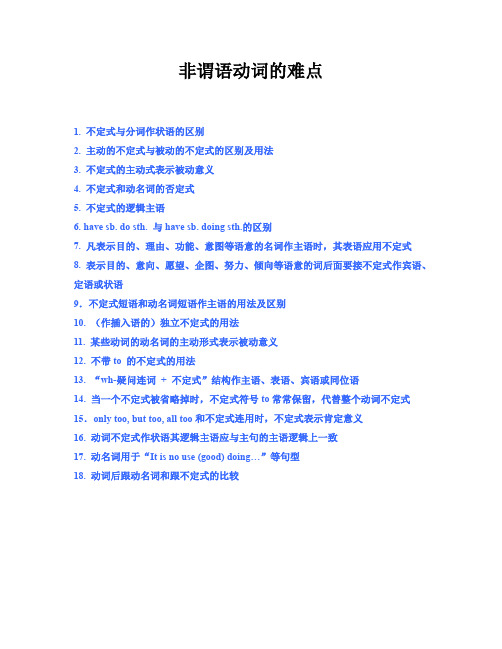
非谓语动词的难点1. 不定式与分词作状语的区别2. 主动的不定式与被动的不定式的区别及用法3. 不定式的主动式表示被动意义4. 不定式和动名词的否定式5. 不定式的逻辑主语6. have sb. do sth. 与have sb. doing sth.的区别7. 凡表示目的、理由、功能、意图等语意的名词作主语时,其表语应用不定式8. 表示目的、意向、愿望、企图、努力、倾向等语意的词后面要接不定式作宾语、定语或状语9.不定式短语和动名词短语作主语的用法及区别10. (作插入语的)独立不定式的用法11. 某些动词的动名词的主动形式表示被动意义12. 不带to 的不定式的用法13. “wh-疑问连词+ 不定式”结构作主语、表语、宾语或同位语14. 当一个不定式被省略掉时,不定式符号to常常保留,代替整个动词不定式15.only too, but too, all too和不定式连用时,不定式表示肯定意义16. 动词不定式作状语其逻辑主语应与主句的主语逻辑上一致17. 动名词用于“It is no use (good) doing…”等句型18. 动词后跟动名词和跟不定式的比较1. 不定式与分词作状语的区别不定式作状语时,只用来表示目的、原因和结果,其位置常常在被修饰词或句子的后面。
分词作状语时,可表示时间、原因、条件、让步、结果、目的、方式或伴随情况,其位置常常在被修饰词或句子的前面。
下面从两者都能充当的几种成分来看一下它们的区别。
1. 不定式与分词作状语的区别A. 作原因状语分词作原因状语时常位于句首或在主谓之间,在意义上相当于一个原因状语从句,强调这个原因。
不定式作原因状语时,常位于句子后面,主句中的谓语动词多是表示内心活动的词,其后的不定式说明他们产生的原因。
e.g. Being poor in health, he retired at the age of fifty.Lost in the strange city, poor Bill fell to cry.He seemed surprised to meet us.I’m happy to hear the news.B. 作结果状语分词作结果状语常由thus引起。
非谓语动词(六)

英语:动词的非谓语形式【重点难点提示】一、重点是:1 .动词不定式(1)动词不定式的构成为:“to + 动词原形〞(有时可不带to)。
动词不定式没有人称和数和的变化。
(2)动词不定式既有名词的特性,又有动词的特性,它可以有自己的宾语和状语。
它在句中可充当主语、宾语、表语、定语、状语和补足语。
2 .动词ing形式的用法。
3 .动词过去分词的用法。
二、难点是:(1)在有些动词后动词不定式作宾语补足语时不带to。
(2)有些动词后只能接动词不定式作宾语。
(3)有些动词后只能接动词ing形式(即动名词)作宾语。
(4)有些动词后既可接动词不定式作宾语,也可接动词ing形式作宾语,但意思不同。
【同步达纲练习】Ⅰ .用括号中所给动词的适当形式填空。
1 .Bill lives in a place called (call) Gum Tree .2 .Let him have (have) a good rest .3 .Li Ping made the baby laugh (laugh) at last .4 .Miss Gao wants to take (take) these books to the classroom now .5 .She is ill .So she had better stay (stay) in bed for a few days .6 .You’d better not look (not ,look) out of the window in class .7 .It was very nice to play (play) with you .8 .They wake up their parents , called (call) :“Merry Christmas !〞9 .A lot of good land has gone with them ,(leave) only sand .10 .There was a fire (burn) in the fireplace .11 .The policeman told the boys (not ,play) football near the road .12 .Why not (go) to the park with us tomorrow ?13 .We’re free now .How about (fly) kites ?14 .We often hear our English teacher (sing) English songs .15 .One day ,his father saw him (sit) on some eggs .16 .Mr Wu have watched us (play) basketball for half an hour .17 .This morning I kept on (think) about the Christmas party this evening .18 .A lot of English people are good at (boat) .19 .We’re very thirsty .Let’s stop (drink) some water .20 .When the two boys saw the teacher ,they stopped (fight) at once .21 .Kate is a little ill .She doesn’t feel like (eat) anything these days .22 .In the old days ,the workers were made (work) more than 16 hours a day .23 .Have you finished (do) your homework yet ?24 .The heavy snow stopped many people from (go) to work .25 .Mary found a watch (lie) on the road on her way to school .26 .Do you like (fish) ?Yes .But I don’t like (fish) now .27 .Thank you for (lend) it to me .28 .Jim and his parents enjoy (live) in China very much .29 .—Do you mind my (smoke) here ?—Yes ,but I do .30 .—Would you like (e) to my birthday party this evening ?—Certainly .I’ll be glad to .31 .Don’t spend too much time (watch) TV .32 .The farmers are busy (get) ready for the next year .33 .We’re going to do some (shop) this Sunday .34 .—Shall we go (skate) tomorrow ?—That’s a good idea .35 .In England ,the first name is the (give) name .36 .Do you know another way of (say) the word ?37 .(take) a walk after supper is good for our health .38 .He quickly got up and went on (run) .39 .Sorry ,I have a lot of work (do) today .40 .It’s very kind of you (help) us .41 .It’s much better (give) than (receive) .42 .I don’t know what (do) next .43 .She’ll read a book tonight instead of (see) a film .44 .England is a (develop) country and India is a (develop) one .45 .That pot was used for (keep) tea hot after it was made .46 .I remember (tell) you the story before .47 .Take the second (turn) on the right .48 .The boy can’t get (dress) himself .49 .Don’t forget (lock) the door when you leave .50 .She’ll try her best (catch) up with the class .参考答案【同步达纲练习】Ⅰ .1 .called 2 .have 3 .laugh 4 .to take 5 .stay 6 .not look 7 .to play8 .calling 9 .leaving 10 .burning 11 .not to play 12 .go 13 .flying 14 .sing15 .sitting 16 .play 17 .thinking 18 .boating 19 .to drink 20 .fighting 21 .eating 22 .to work 23 .doing 24 .going 25 .lying 26 .fishing ,to fish 27 .lending28 .living 29 .smoking 30 .to e 31 .watching 32 .getting 33 .skating 34 . skating 35 .given 36 .saying 37 .Taking 38 .running 39 .to do 40 .to help 41 .to give ,to receive 42 .to do 43 .seeing 44 .developed ,developing 45 .keeping 46 .telling 47 .turning 48 .dressed 49 .to lock 50 .to catch非谓语动词专项练习题一、用所给动词适当形式填空:A . ① I want one magazine ______ . ( read )② My teacher wanted me ______ this question . ( answer )③ The woman wanted her husband ______ at once . ( examine )④ My bicycle wants _______ . ( repair )B . ① What made you ______ so ? ( think )② The girl was made _____ a man she didn`t love at all . ( marry )③ The show made me _______ in the study of science . ( interest )④ He raised the picture to make everyone _______ clearly . ( see )⑤ He raised his voice to make himself _______ . ( hear )⑥ My father himself made some candles _______ light . ( give )⑦ The boss made the workers _______ day and night . ( work )C . ① You`d better get your own room _______ . ( clean )② Yesterday he got his wallet _______ . ( steal )③ You should get your friends _______ you . ( help )④ The lecture got us _______ . ( think )⑤ Don`t get ________ in the rain . ( catch )D . ① Did you see somebody _______ into the room ? ( steal )② I saw him _______ in the room at that time . ( read )③ She was glad to see her child ________ good care of . ( take )④ I saw her _______ at the windows , thinking . ( seat )⑤ She was seen ________ here . ( e )E . ① I like _______ very much . ( swim )② I don`t like _______ TV at this time . ( watch )③ He never likes _______ at the meeting . ( praise )④ I feel like _______ to the cinema . ( go )⑤ Would you like ______ with me ? ( go )F . ① The man ______ at the meeting now is from the south . ( speak )② I don`t know the professor ______ at the meeting tomorrow . ( speak )③ He is the professor _______ to dinner . ( invite )G . ① It was so cold and he had the fire _______ all night long . ( burn )② I have a lot of exercises ________ today . ( do )③ "Do you have nay clothes _______ today ? "asked Mother . ( wash )④ You`d better have that bad tooth _______ out . ( pull )⑤ I want to have him _______ a car for me . ( find )H . ① He doesn`t do anything but _______ all day . ( play )② We have no choice but _______ . ( obey )③ I`m thinking of how _______ my English . ( improve )④ He made an apology for _____ late . ( be )I . ① He told us about his trip in an _______ voice . ( excite )② He told us his story in a _______ voice . ( tremble )③ At the sight of a snake , the little girl was very _______ . ( frighten )④ The boy was _______ , so I didn`t believe him again . ( disappoint )J . ① He is looking forward to ______ college . ( enter )② He is looking forward to _____ nothing . ( see )K . ① When he heard the news , he couldn`t help ________ with joy . (jump)② I couldn`t help ______ by the beauty of nature . ( strike )③ Sorry , I can`t help ______ the housework today . ( do )L . ①______ enough time , we`ll do it better . ( give )②______ a candle , he went on reading . ( light )③______ from the hill , the park looks more beautiful . ( see )④______ the people well , we must work hard at our lessons . ( serve )二、单项选择:〔1〕1. Saying always has less difficulty than _____.A. doneB. doingC. to doD. having done2. The girl is seriously ill. There is _____.A. nothing to do but send for a doctorB. something to do but to send for a doctorC. nothing to do but to send for a doctorD. anything to do but sending for a doctor3. The rest of the money _____ to Alice.A. is to sendB. are to sendC. is to be sentD. are to be sent4. Although swimming is his favorite sport, yet he doesn’t like _____ t oday.A. to swimB. swimmingC. swimD. to have swim5. She said she was sorry _____ the train, so she had to stay here for another day.A. missingB. having missedC. to missD. to have missed6. _____ the same mistake again made his parents very angry.A. His being madeB. He has madeC. He had makingD. His making7. I find the man hard _____.A. to be pleasedB. pleasingC. pleasedD. to please8. You’d better not have t he lights _____ all day long.A. burningB. burnedC. to burnD. being burnt9. It is _____ thinking about it now.A. of no useB. not useC. no useD. not of any uses10. —Would you like to sing a song for us?—_____.A. I prefer notB. I prefer not toC. I prefer to notD. I wouldn’t prefer11. He insisted _____ the working site.A. to be sent toB. being sent toC. on being sent toD. that to be sent to12. During the next ten years, she had to work hard _____ for the necklace.A. payingB. to payC. for payingD. in order to paying13. Janet was angry at _____.A. my not waiting for herB. I didn’t wait for herC. me not wait for herD. me to not wait for her14. I prefer staying at home _____ the theater.A. to go toB. for going toC. to going toD. rather than go15. Please get someone _____ the washing machine. I want to get it _____ as soon as possible.A. to repair/to be repairedB. repair/repairedC. to repair/repairingD. to repair/repaired16. _____ more time, he could have done the work much better.A. To be givenB. To giveC. GivenD. Giving17. The information _____ to us is of great value.A. broughtB. takenC. being takenD. being carried18. The building _____ next month will be a modern hospital.A. builtB. being builtC. to be builtD. be built19. Jessie was sick _____ such noise.A. of hearingB. to hearC. of being heardD. heard20. _____, he left the room.A. Finishing the workB. Had finished the workC. After finished the workD. Having finished the work21. _____ afraid _____ behind, Bill studied even harder than ever before.A. To be/of fallingB. Being/fallC. Being/of fallingD. To be/to fall22. The machine requires _____, so the workers are required _____ ready.A. repair/to getB. repairing/to getC. repairing/gettingD. to be repaired/getting23. Everyone dislikes _____.A. being laughedB. to be laughedC. being laughed atD. to be laughed at24. Would you like Helen _____ you since you have some difficulty?A. helpingB. to helpC. has helpedD. help25. He is beginning _____ his mistakes.A. correctB. to correctC. correctingD. corrected26. The Americans can’t use chopsticks _____.A. to eatB. to eatingC. eatingD. to eat with27. My wish is _____ the people well in the future.A. to serve forB. to serveC. servingD. serving for28. The poor boy, _____ with extraordinary strength, _____ from the ground.A. filled/roseB. filling/roseC. full/raisedD. filled/risen29. Most shops are open every day, Sunday _____.A. includingB. includedC. being includedD. to include30. _____ hot, he left only his stomach _____ with a piece of cloth.A. Feeling/coveringB. Feeling/coveredC. Felt/coveredD. Felt/covering31. He advised _____ a meeting _____ the problem.A. holding/to discussB. holding/for discussingC. to hold/to discussD. hold/discussing32. _____ the teacher, and he will tell you the answer.A. AskingB. AskC. If askD. If you ask33. The thief entered the room without _____.A. noticingB. being noticedC. having noticedD. having been noticed34. I happened _____ the story when she told me about it.A. having heard ofB. to have heard ofC. to be heard ofD. to hear of35. He is said _____ abroad already.A. having sentB. to be sendingC. to have been sentD. being sent36. He was made _____ working because of his poor health.A. stoppingB. to stopC. stoppedD. stop37. Do you consider it any good _____ again?A. to tryB. tryC. tryingD. for you to try38. I regret _____ you that we are unable to offer you a job.A. informingB. having informedC. to informD. to informing39. I would appreciate _____ back this afternoon.A. you to callB. you callC. your callingD. you’re calling40. She admitted _____ the key.A. being takingB. to takeC. having takenD. to have taken41. Besides _____, she is kind and tender.A. beautifulB. being beautifulC. she beautifulD. is beautiful42. I don’t want to speak to you, but I _____.A. have to speakB. have toC. must speakD. must43. I wondered whether the movie was _____ worth _____.A. very/seeingB. well/being seenC. very/being seenD. well/seeing44. The lecturer began by _____ us where the island was, and went on _____ about its history.A. telling/talkingB. to tell/to talkC. telling/to talkD. he told/talking45. After seeing the movie, _____.A. the book was read by himB. the book made him want to read itC. he wanted to read the bookD. the reading of the book interested him46. —Why doesn’t he take notes?—He has no pen _____. He seems _____ it.A. to write/to forget bringingB. to write with/to forget to bringC. to use with/to have forgotten to bringD. to write with/to have forgotten to bring47. When _____, water can be changed into vapor.A. heatedB. being heatedC. having been heatedD. to heat48. Having finished the work, _____.A. it was almost six o’clockB. a postman came and delivered the evening paper and some lettersC. supper had already been preparedD. we had a rest and then had supper49. _____, she felt quite shy at the party.A. As she a strangerB. Being a strangerC. According to a strangerD. She was a stranger50. Flank went to the swimming pool _____ swimming.A. to goB. goneC. goingD. go51. The _____ girl sat in the corner, crying.A. frightenB. frightenedC. frighteningD. fright52. On a _____ morning the little match girl was found _____ at the corner ofthe street.A. freezing/freezingB. freezing/frozenC. frozen/frozenD. frozen/freezing53. They found a _____ old man _____ on the ground when the door was broken open.A. dying/lyingB. dying/liedC. dead/liedD. dead/lain54. Be quick, or you’ll get _____ in the rain.A. to be caughtB. catchingC. to catchD. caught55. Who could have imagined such a sweet-tempered girl as Jane _____ such a thing!A. doingB. to doC. will doD. does56. He told me not to leave the pot _____.A. uncoveredB. to uncoverC. to be uncoveredD. uncovering57. The experience made him _____ the study of science.A. interest inB. to interest inC. interesting inD. interested in58. He managed to make himself _____ with his _____ English.A. understood/breakingB. understood/brokenC. understand/breakingD. understand/broken59. Did you hear the sound like that of a door _____?A. burstB. to burst inC. burst inD. to be burst in60. I was deep in thought, so I didn’t notice _____.A. him to e inB. him e inC. he e inD. him ing in61. Have you any objection to _____ there on foot?A. be goingB. goingC. goD. went62. The wallet was returned to him without anything _____.A. missedB. to be missedC. missingD. to miss63. The teacher was far from _____ with the result of the exam.A. satisfyB. satisfiedC. being satisfiedD. satisfying64. Hurry up! Mother is sure _____ us at home.A. waitingB. to wait forC. to be waitingD. to be waiting for65. Mr Brown is said _____ a new novel.A. to writingB. to have been writtenC. to be writtenD. to have written66. When _____ into a warm room, the ice soon changed to water.A. to takeB. to be takenC. takingD. taken67. The old man walked in the street _____.A. followed his sonB. and following his sonC. and followed by his sonD. followed by his son68. _____ with fear, a hungry fox hid himself in a small cave, _____ his tail to the rain.A. Trembling/exposingB. Trembled/exposedC. Trembled/exposingD. Trembling/exposed69. The two farmers _____ what appeared to be small guns forced the enemy officer to hand in his map.A. carriedB. were carryingC. carryingD. had carried70. Six _____ nine makes fifteen.A. added toB. adds toC. added up toD. added by71. The lecturer _____ will be here tomorrow.A. to talk about so muchB. to be talking about so muchC. so much talking aboutD. so much talked about72. _____ some of the questions _____, the Premier said goodbye to us.A. Left/unansweredB. Leaving/unansweredC. Leaving/unanswerD. Left/unanswer73. _____ her mother had e, her face lit up.A. HearingB. Having heardC. When heardD. When she heard74. _____ in white, she looks much more beautiful.A. WearingB. DressingC. DressedD. Having dressed75. _____, the boy couldn’t enter his house.A. Since the key had lostB. The key being lostC. Lost the keyD. Having lost the key76. The Arctic is considered _____ the northern part of the Atlantic.A. having beenB. to have beenC. to beD. being77. It is impossible for the work _____ within a month.A. finishingB. being finishingC. to finishD. to be finished78. I am too glad _____ you.A. to seeB. seeingC. sawD. at seeing79. There is _____ what the weather will be like.A. not knowingB. no knowingC. not knowD. no known80. The bottle _____ the poison was sent to the laboratory for a test.A. containingB. containedC. which containingD. which is contained81. _____ the children, we are all sure everything will be all right.A. With him taken care ofB. With he taken care ofC. With him taking care ofD. With he taking care of82. At first she wanted to go to the cinema, but on second thoughts she decidedit would be better _____ at home and _____.A. stay/workB. to stay/to workC. stay/to workD. to stay/work83. He didn’t speak to me, let alone _____ me.A. helpB. to helpC. helpingD. helped84. The people’s government does its best to have the living standard of the people _____.A. risenB. raisedC. riseD. raise85. The little girl found her teddy bear _____ under the bed.A. hidingB. to hide86. Mr Smith is _____ to our English evening.A. more pleased than to eB. more pleased to e thanC. more than pleased to eD. more pleasing than to e87. Once _____, a bad habit is rather difficult to get rid of.A. formedB. to be formedC. formingD. having formed88. You can have no idea what is _____ to do when you e to see the strange boss.A. orderingB. being orderedC. to orderD. to be ordered89. The noise of the door _____ the baby.A. closing wakenB. to close wokeC. closed wakeD. being closed woke90. Please leave a window _____, for it’s too hot.A. openB. openingC. to openD. opened91. _____ not knowing the answer to such an easy question!A. HopeB. DecideC. ImagineD. Think92. He asked to be kept _____ about developments.A. informingB. informedC. to informD. inform93. _____ everywhere, the wolves had nowhere _____ themselves.A. Hunting/to hideB. To hunt/to hideC. Hunted/hidingD. Hunted/to hide94. It _____ this way.A. used to doB. used to be doneC. is used to doingD. is using to do95. They have a lot of difficulty _____.A. in overingB. to overe it96. Didn’t you forget us _____ together in the countryside?A. to workB. to workingC. workingD. worked97. You always hear about planes _____ because of technical faults.A. having been delayedB. being delayedC. having delayedD. delaying98. These are needed for _____ clothes, paper and other necessaries.A. the making ofB. making ofC. to makeD. makings99. Have the police caught _____ yet?A. the prisoner who escapesB. the escaping prisonerC. the escaped prisonerD. the prisoner have escaped100. Do you still remember _____ you when you stayed in hospital?A. my mother and me visitingB. my mother’s and my visitingC. my mother and me to visitD. my mother and me to have visited三、单项选择〔2〕1. There ______ no classes yesterday, we paid a visit to the Great Wall.A. wasB. beingC. wereD. had been2. The policeman rushed into the room only ______ an old lady lying on the ground.A. foundB. findC. findingD. to find3. The boy lay on the ground, his eyes ______ and his hands ______.A. closing; tremblingB. closed; tremblingC. closed; trembledD. closing; trembled4.______, the girls raced on to the second runners.A. Stick in handB. With a stick in her handC. Sticks in handD. Sticks in hands5. Each of them got up early ______ to catch the early bus.A. to hopeB. hopingC. so thatD. and6. How pleased the Emperor was ______ what the cheats said!A. hearingB. heardC. hearD. to hear7. We should prevent pollution ______ happily.A. from livingB. livingC. to livingD. to live8.I am busy now, so I can’t help ______ the machine.A. repairB. to have repairedC. repairingD. fixing9. Jane came very close ______ a gold medal for Britain in the Olympics.A. to winB. winningC. to winningD. to be won10. The boy seated himself in the corner with his back ______ to his father.A. turningB. to turnC. to be turnedD. turned11. ----By the way, when did you get your bedroom ______?----Last week.A. to paintB. paintedC. paintingD. to be painted12. He likes ______, but he doesn’t like ______ today because it is too cold.A. to swim; to swimB. swimming; swimmingC. to swim; swimmingD. swimming; to swim13. There is ______ what the weather will be like.A. not knowingB. no knowingC. not knowD. no known14. The novel is said ______ into many languages.A. to translateB. being translatedC. to have been translatedD. having been translated15. I’m examining the position he has just finished ______ the possible mistakes in it.A. correctingB. to correctC. correctedD. correct16. They would not allow him ______ across the enemy line.A. to risk goingB. risking to goC. for risk to goD. risk going17. He spent as much time as he could _____ the child.A. teachingB. to teachC. teachD. for teaching18. ----Alice, why didn’t you e yesterday?----I ______, but I had an unexpected visitor.A. hadB. wouldC. was going toD. did19. How pleased the Emperor was ______ what the cheats said!A. hearingB. to hearC. heardD. hear20. ______ the room, a letter was laid on the ground.A. EnteringB. Having enteredC. He enteredD. Mrs Green entering21. They set out ______ for the ______ boy.A. searching; losingB. searching; lostC. to search; lostD. to search; missed22. ______ her mother had e, her face lit up.A. HearingB. Having heardC. When hearingD. When she heard23. They arrived at their university very late, ______ the gate closely shut.A. foundB. to findC. findD. finding24. ----Do you have anything more ______, sir?----No. You can have a rest or do something else.A. typingB. to be typedC. typedD. to type25. The manager promised to keep me ______ of how our business was going on.A. to be informedB. on informingC. informedD. informing26. With a lot of difficult problems ______, the manager felt worried all the time.A. to settleB. settlingC. settledD. being settled27. Will those ______ the children from abroad e to the headmaster’s office?A. teachingB. teachC. who teachesD. who teaching28. After ______ for the job, you will be required to take a language test.A. being interviewedB. interviewedC. interviewingD. having interviewed29. They apologized for ______ to attend the meeting.A. their not being ableB. their being not ableC. them not ableD. them being able not30. They would not allow him ______ across the enemy line.A. to risk goingB. risking to goC. for risk to goD. risk going31. ______ to nuclear radiation, even for a short time, may produce variants(变异体) of genes in human bodies.A. Being exposedB. Having exposedC. ExposedD. After being exposed32. China became the 143rd member of the World Trade Organization on December 11, 2001, thus ______ its 15-year wish to join the global trade body.A. having realizedB. realizedC. realizingD. to realize33. Tom looked at Jenny, tears ______ his eyes, and shouted out the words ______ in his heart for years.A. filling; having hiddenB. filled; hiddenC. filling; hiddenD. filled; hiding34. They apologized for ______ to attend the meeting.A. their not being ableB. their being not ableC. them not ableD. them being able not35. Which will you enjoy ______ your vacation, traveling abroad or working in the countryside?A. to spendB. spendC. spendingD. spent36. ----Will you please tell us how you can seize the robbers?----I will spend a whole week ______ in your room to wait for their ing.A. lockingB. to lockC. lockedD. being locked37. I regret ______ you that they are unable to e to your wedding tomorrow.A. informingB. having informedC. to have been informedD. to inform38. He wondered if he could slip out of the lecture hall without anyone ______.A. noticingB. noticedC. to noticeD. being noticed39. After ______ for the job, you will be required to take a language test.A. being interviewedB. interviewedC. interviewingD. having interviewed40. He spoke in such a high voice ______ out in the street.A. as to be heardB. to be heardC. as to hearD. to hear41. As early as 1647 Ohio made a decision that free, tax-supported schools must be set up in every town ______ 50 households or more.A. havingB. to haveC. to have hadD. having had42. The building project ______ next year is, I think, not easy ______ in time.A. being carried out; to pleteB. carried out; to be pletedC. to be carried out; to pleteD. to be carried out; to be pleted43. The reason ______ she gave for not ing to the party is that her mother wouldn’t allow her to.A. thatB. whatC. whyD. because44. Excuse me, could you tell me how to get to the Grand Hotel? I thought it was on this corner, but I seem to ______ a mistake.A. makeB. be makingC. having madeD. have made45. ----Here’s a new pair of shoes for you.----Thank you, but there’s no need ______ a new pair for me.A. to have boughtB. to buyC. buyingD. to be buying46. What worried the boy most was ______ to visit his father in the hospital.A. his not allowingB. his not being allowedC. having not been allowedD. his being not allowed47. To do a bit for the motherland, ______.A. working hard is necessaryB. to learn a foreign language is neededC. it is important to master scienceD. one should serve the people whole-heartedly48. Everything ______ into consideration, they ought to have another chance.A. to takeB. takenC. to be takenD. taking49. The officials discussed the plan that they would like to see ______ the next month.A. carry outB. carrying outC. to carry outD. carried out50. With a lot of difficult problems ______, the manager felt worried all the time.A. to settleB. settlingC. settledD. being settled51. ----Do you have anything more ______, sir?----No, you can have a rest or do something else.。
高中英语非谓语动词难点考点易错归纳及解题技巧

高中英语非谓语动词难点考点易错归纳及解题技巧
HI,我是洪老师~~
高中学生经常感到无助的语法之一就是非谓语动词,而它却占很重要的地位,在历年高考中为必考知识点。
要想学生把英语学好,以及对英语产生兴趣,必须得把这一拦路虎打掉。
那么如何处理呢?
首先,可以把历年高考试题都做了一篇。
那么遇到非谓语试题就需要认真做,甚至把解题解析反复揣摩,不懂的和有疑惑的请教的老师。
其次,多点总结易错难点考点。
下面是高中英语易错难点归纳总结的笔记系列之更新的非谓语动词难点考点易错归纳及解题技巧!
例如会针对动名词与不定式的不同、动名词作主语与动词不定式作主语的比较、进行分析整理,
过去分词只有一种形式:规则动词由动词原形加词尾-ed构成。
不规则动词的过去分词没有统一的规则要求,要一一记住。
本套系列笔记资料编号是:067,如需完整的word版大全,可以发私信067给我,也可以先点我头像,然后底下有个菜单按钮【洪粉必看】,点开有具体的内容提示。
资料预览:。
人教版英语非谓语动词难点、易错点含答案解析百度文库

人教版英语非谓语动词难点、易错点含答案解析百度文库一、非谓语动词1.The boss asked Tim to go and out if there was anyone else absent.A. findB. findingC. to findD. found【答案】A【解析】【分析】句意:如果有其他人缺席,老板让蒂姆去弄清楚。
and前后并列,前面是动词不定式to go,此处要省略动词不定式to,故此处为动词原形find,故选A。
【点评】本题考查非谓语动词。
当and链接动词不定式的时候后面一个不定式省去to。
2.My friend invited me ______ the Art Club , and I accepted it with pleasure.A. joinB. to joinC. joinedD. joining【答案】 B【解析】【分析】句意:我的朋友邀请我参加艺术俱乐部,我愉快地接受了。
A.动词原形;B.动词不定式;C. 动词过去式;D.动词的ing形式。
invite sb. to do sth.邀请某人做某事。
结合句意及结构,故选B。
3.As we all know, a person learns many things by making mistakes and ________ them.A. correctsB. correctC. to correctD. correcting【答案】 D【解析】【分析】句意:正如我们所知,一个人通过犯错误和纠正错误中,能学会很多东西。
and,表并列的连词,前后动词用法应该一致,根据making,可知此处用动词ing形式,因此用correcting,故选D。
【点评】考查固定搭配。
注意介词后接动词的ing形式。
4. Whenever we kids come over, Auntie Susan just stands there and watches us ________ sure we don't break anything.A. makeB. madeC. to makeD. making【答案】 C【解析】【分析】句意:无论什么时候我们这些孩子们来到这里,Susan姨妈只是站在那里,看着我们以确保我们不打破什么东西。
非谓语动词难点讲解

一、语法讲解(一)主谓关系和动宾关系主谓关系中心词与不定式所表示的动作之间具有逻辑上的主谓关系,即中心词是不定式动作的发出者。
如:She is always the first to come to school. 句中的the first 是come to school的逻辑主语,即这个动作的发出者。
动宾关系广义的讲,所谓宾语,它可以少掉主语却不可以没有动词,也就是说宾语是依附于动词而存在的,只要是动词涉及到的对象,我们就可以说该对象与动词之间是动宾关系。
因此动宾关系可以出现在各种情况,如:1. 直接跟在动词后面2. 出现在被动语态中,如:The movie has been shown many times. 这部电影多次被放映。
(movie 与shown 是动宾关系)3. 出现在非谓语动词中,如:You must have the question confirmed.. 你必须得(让人)确认这个问题。
(即问题被确认,question 与confirmed 是动宾关系)Anna was reading a piece of science fiction, completely lost to the outside world.安娜正在看一部科幻小说,对外面的事情一无所知。
(句子 a piece of science fiction与过去分词lost 是动宾关系)1. Following a dog, the hunter appeared.猎人出现了,前面走着一只狗。
2. The hunter appeared, followed by a dog.猎人出现了,后边跟着一只狗。
句1中,现在分词短语作状语,与句子主语形成逻辑上的主谓关系,即:The hunter followed a dog.。
句2中,过去分词短语作状语,与句子主语存在逻辑上的动宾关系,即:The hunter was followed by a dog.再如:3. Seen from space, the earth looks blue.从太空上看,地球是蔚蓝一片。
英语非谓语重难点考点总结
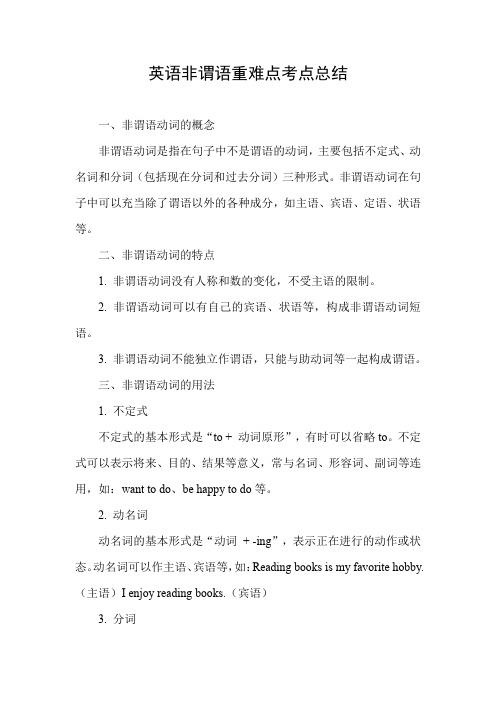
英语非谓语重难点考点总结一、非谓语动词的概念非谓语动词是指在句子中不是谓语的动词,主要包括不定式、动名词和分词(包括现在分词和过去分词)三种形式。
非谓语动词在句子中可以充当除了谓语以外的各种成分,如主语、宾语、定语、状语等。
二、非谓语动词的特点1. 非谓语动词没有人称和数的变化,不受主语的限制。
2. 非谓语动词可以有自己的宾语、状语等,构成非谓语动词短语。
3. 非谓语动词不能独立作谓语,只能与助动词等一起构成谓语。
三、非谓语动词的用法1. 不定式不定式的基本形式是“to + 动词原形”,有时可以省略to。
不定式可以表示将来、目的、结果等意义,常与名词、形容词、副词等连用,如:want to do、be happy to do等。
2. 动名词动名词的基本形式是“动词+ -ing”,表示正在进行的动作或状态。
动名词可以作主语、宾语等,如:Reading books is my favorite hobby.(主语)I enjoy reading books.(宾语)3. 分词分词分为现在分词和过去分词两种形式。
现在分词的基本形式是“动词+ -ing”,表示正在进行的动作或状态;过去分词的基本形式是“动词+ -ed”,表示已经完成的状态或动作。
分词可以作定语、状语等,如:the exciting match(定语)、the match finished at 8:00(状语)。
四、非谓语动词的难点考点1. 非谓语动词作主语的判断非谓语动词作主语时,主要判断该句子缺什么成分,如果缺主语,就可以考虑使用动名词或不定式。
例如:____(see)is believing. 这句话缺少主语,可以使用动名词或不定式,但根据句意“眼见为实”,应该使用动名词。
2. 非谓语动词作宾语的判断非谓语动词作宾语时,主要判断该动作与句子主语的关系。
如果该动作是句子主语的主动行为,则使用不定式;如果该动作是句子主语的被动行为,则使用动名词。
高中英语高考语法易错知识点8.非谓语动词(考点梳理+易错点)
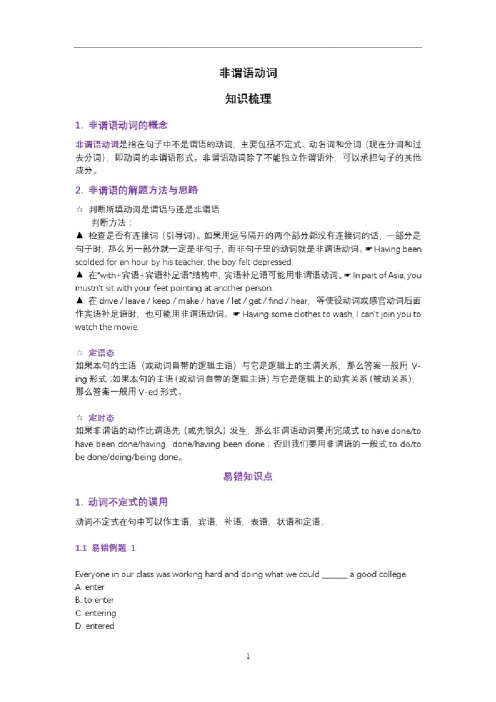
非谓语动词知识梳理1.非谓语动词的概念非谓语动词是指在句子中不是谓语的动词,主要包括不定式、动名词和分词(现在分词和过去分词),即动词的非谓语形式。
非谓语动词除了不能独立作谓语外.可以承担句子的其他成分。
2.非谓语的解题方法与思路六判断所填动词是谓语与还是非谓语判断方法:▲检查是否有连接词(引导词)。
如果用逗号隔开的两个部分都没有连接词的话.一部分是句子时,那么另一部分就一定是非句子,而非句子里的动词就是非谓语动词O -■Having been scolded for an hour by his teacher,the boy felt depressed.▲在"with+宾语+宾语补足语•结构中,宾语补足语可能用非谓语动词。
■In part of Asia,you mustn't sit with your feet pointing at another person▲在drive/leave/keep/make/have/let/get/find/hear,等使役动词或感官动词后面作宾语补足语时,也可能用非谓语动词。
Having some clothes to wash,I cant join you to watch the movie.*定语态如果本句的主语(或动词自带的逻辑主语)与它是逻辑上的主谓关系,那么答案一般用V-mg形式;如果本句的主语(或动词自带的逻辑主语)与它是逻辑上的动宾关系(被动关系),那么答案一般用V-ed形式。
*定时态如果非谓语的动作比谓语先(或先很久)发生,那么非谓语动词要用完成式to have done/to have been done/havmg done/having been done;否则我们要用非谓语的一般式to do/to be done/doing/being done。
易错知识点1.动词不定式的误用动词不定式在句中可以作主语,宾语,补语.表语,状语和定语。
非谓语动词易错点讲解
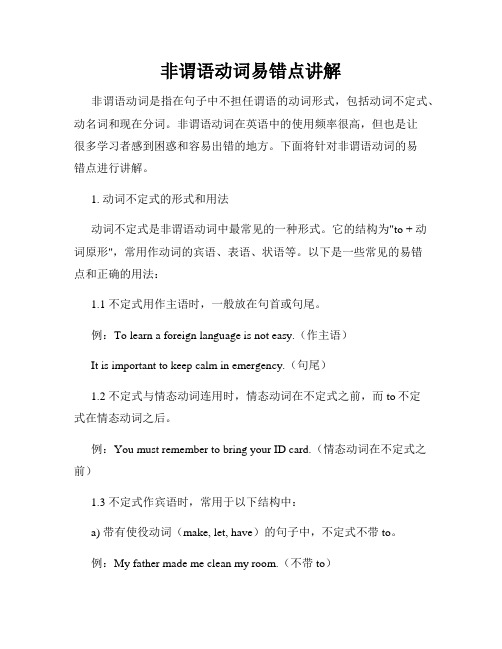
非谓语动词易错点讲解非谓语动词是指在句子中不担任谓语的动词形式,包括动词不定式、动名词和现在分词。
非谓语动词在英语中的使用频率很高,但也是让很多学习者感到困惑和容易出错的地方。
下面将针对非谓语动词的易错点进行讲解。
1. 动词不定式的形式和用法动词不定式是非谓语动词中最常见的一种形式。
它的结构为"to + 动词原形",常用作动词的宾语、表语、状语等。
以下是一些常见的易错点和正确的用法:1.1 不定式用作主语时,一般放在句首或句尾。
例:To learn a foreign language is not easy.(作主语)It is important to keep calm in emergency.(句尾)1.2 不定式与情态动词连用时,情态动词在不定式之前,而to不定式在情态动词之后。
例:You must remember to bring your ID card.(情态动词在不定式之前)1.3 不定式作宾语时,常用于以下结构中:a) 带有使役动词(make, let, have)的句子中,不定式不带to。
例:My father made me clean my room.(不带to)b) 动词感官(see, watch, hear)和感受(feel)后,不定式需带to。
例:I heard her sing in the competition.(带to)1.4 不定式作定语时,修饰名词或代词,位置在被修饰词之后。
例:I have a book to read.(修饰名词)The man to whom I spoke is my teacher.(修饰代词)2. 动名词的形式和用法动名词是以-ing结尾的非谓语动词形式,它可以作主语、宾语、表语、定语等。
以下是一些常见的易错点和正确的用法:2.1 动名词作主语时,谓语动词要用单数形式。
例:Swimming is my favorite hobby.(动名词作主语)2.2 动名词作宾语时,常常跟随某些动词(enjoy, avoid, finish, suggest等)之后。
最新非谓语动词在高考中的考点及易错点(详解)

非谓语动词在高考中的考点及易错点一.非谓语题的解题总方法与思路:1.先看四个答案:如果四个答案分别为动词原形、不定式、现在分词、过去分词等情况,那么这个题多半是非谓语动词题。
2.看符号:中间有个逗号,末尾有个句号(有时中间没有逗号);3.看有没有连接词(引导词)。
如果用逗号隔开的两个部分都没有连接词的话,一部分是句子时,那么另一部分就一定是非句子,而非句子里的动词就是非谓语动词。
4.定语态:如果本句的主语(或动词自带的逻辑主语)与它是逻辑上的主谓关系,那么答案一般用Ving形式;如果本句的主语(或动词自带的逻辑主语)与它是逻辑上的动宾关系(被动关系),那么答案一般用Ved形式。
5.定时态:如果非谓语的动作比谓语先(或先很久)发生,那么非谓语动词要用完成式(to have done/to have been done/ having done/ Having been done),否则我们要用非谓语的一般式(to do / to be done / doing / being done / done)。
Eg.1._________ for an hour by his teacher, the boy felt depressed.A. Being scoldedB. Having been scoldedC. To be scoldedD. Scolding 【1答案:B】二.非谓语动词可能出现的考查点及易错点:一).使用非谓动词的语言结构。
1)在“句子, and/or/but +句子”的并列句结构中,可能会考查“以动词原形开头”的祈使句,四个答案表面上象非谓语,其实考查的是谓语。
2.______hard and you will succeed in the exam.3.______hard or you will fail in the exam.A. StudyB. To studyC. StudyingD. Studied 【2、3答案:AA】2)在“句子,非句子”结构中,非句子部分用非谓语:4. The teacher devoted his life to his career, ______ most of his students successful in study.A. makeB. to makeC. makingD. made 【4答案:C】3)在“非句子,句子”结构中,非句子部分用非谓语:5. _________with children, I know what is needed most.A. WorkingB. Having workedC. WorkedD. To work 【5答案:B】4) 在“with + 宾语+ 宾语补足语”结构中,宾语补足语可能用非谓语动词:6. With her baby _______ on her b ack, the woman was cleaning the rich man’s house.A. sleepB. sleptC. to sleepD. sleeping 【6答案:D】7. With his hair _______ like a role in the film, the boy felt very cool.A. cutB. to be cutC. cuttingD. to cut 【7答案:B】5)在drive/leave/keep/make/have/let/get/find/hear…等使让动词或感观动词后面作宾语补足语时,也可能用非谓语动词。
非谓语动词易错点.doc
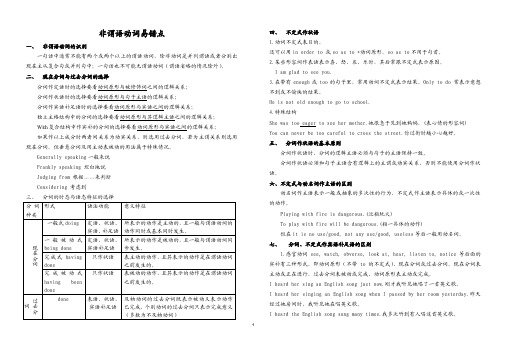
非谓语动词易错点一、非谓语动词的识别一句话中通常不能有两个或两个以上的谓语动词,除非动词是并列谓语或者分别出现在主从复合句或并列句中;一句话也不可能无谓语动词(谓语省略的情况除外)。
二、现在分词与过去分词的选择分词作定语时的选择要看动词原形与被修饰词之间的逻辑关系;分词作状语时的选择要看动词原形与句子主语的逻辑关系;分词作宾语补足语时的选择要看动词原形与宾语之间的逻辑关系;独立主格结构中的分词的选择要看动词原形与其逻辑主语之间的逻辑关系;With复合结构中作宾补的分词的选择要看动词原形与宾语之间的逻辑关系;如果作以上成分时两者间关系为动宾关系,则选用过去分词,若为主谓关系则选用现在分词。
但垂悬分词及用主动表被动的用法属于特殊情况。
Generally speaking一般来说Frankly speaking 坦白地说Judging from 根据……来判断Considering 考虑到三、分词的时态与语态特征的选择四、不定式作状语1.动词不定式表目的。
还可以用in order to 或so as to +动词原形。
so as to不用于句首。
2.某些形容词作表语表示喜、怒、哀、乐时,其后常跟不定式表示原因。
I am glad to see you.3.在带有enough或too的句子里,常用动词不定式表示结果。
Only to do 常表示意想不到或不愉快的结果。
He is not old enough to go to school.4.特殊结构She was too eager to see her mother.她很急于见到她妈妈。
(表心情的形容词) You can never be too careful to cross the street.你过街时越小心越好。
五、分词作状语的基本原则分词作状语时,分词的逻辑主语必须与句子的主语保持一致。
分词作状语必须和句子主语含有逻辑上的主谓或动宾关系,否则不能使用分词作状语。
易错点08 非谓语动词(5大陷阱)-备战高考英语考试易错题(原卷版)

易错点08 非谓语动词目录01 易错陷阱(5大陷阱)02 举一反三【易错点提醒一】非谓语动词作状语易混易错点【易错点提醒二】非谓语动词作定语易混易错点【易错点提醒三】非谓语动词作宾语补足语易混易错点【易错点提醒四】非谓语动词作宾语易混易错点【易错点提醒五】非谓语动词作表语和主语易混易错点易混易错点03 易错题通关易错陷阱1:非谓语动词作状语易混易错点。
【分析】非谓语动词作状语,其逻辑主语是句子的主语。
易错陷阱2:非谓语动词作定语易混易错点。
易错陷阱4:非谓语动词作宾语易混易错点。
易错陷阱5:非谓语动词作表语和主语易混易错点。
【易错点提醒一】非谓语动词作状语易混易错点【例1】(广东省2023-2024学年6校高三联考)The tablet, (find) in Jindong Village, measures 1.4 meters high, 0.61 meters wide, and 0.14 meters thick.【变式1】(广东省六校2023-2024学年高三第一次联考试题)Dr. Wang began to question the umbrella species narrative and carried out research, only (find) that panda conservation had not helped large carnivores in China.【变式2】(广东省广东省四校联考2023-2024学年高三9月试题)The study, which appeared in the journal PLOS Medicine,indicates that individuals who take in higher-than-average amounts of【变式3】(2023年广东高三模拟)_______ (dress) in a full body suit of ice, a symbol of purity and strength, the panda wears a helmet with colored halo.【易错点提醒二】非谓语动词作定语易混易错点【例2】(湖南省常德市第一中学2023-2024学年高三试题)Huawei, which has endured years of US sanctions, surprised the world on Aug 29, with an unadvertised announcement -the launch of its latest high-end smartphone, the Mate 60 Pro, (price) at 6,999 yuan ($964).【变式1】(广东省湛江市第一中学2023-2024学年高三试题)A resort (度假胜地) in Vietnam has opened a glass-bottomed foot bridge, the third such bridge in the Southeast Asian country, ______ (connect) two mountains.【变式2】(2023年广东省佛山市顺德区均安中学高三试题)There are many ways (enjoy) spring bamboo shoots, from nutritious soups to fun snacks.【变式3】(广东省2023-2024学年6校高三联考)A stone tablet(牌匾) (date) back to the year 1693, which falls within the Qing Dynasty(1644—1911), was discovered in Daming County,north China’s Hebei Province, said local authorities.【易错点提醒三】非谓语动词作补语易混易错点【例3】(广东省广州市2023-2024学年高三训练试卷)This film not only identifies with the“Chinese Poetry Universe.”【变式1】(湖北省孝感市重点高中协作体2023-2024学年高三试题)It is estimated that by the end of this year, the number of people using hanfu products in China will reach 6.89 million, with total【变式2】(湖南师范大学附属中学2023-2024学年高三摸底考试)When she spotted such abandoned goods, she put a pair of eyeball-shaped stickers on them before publishing notes on her social media accounts, and guiding others_______ ( pick) them up from the streets.【变式3】(湖南省岳阳第一中学2023-2024学年高三试题)With more demand (come) from domestic market, artists began painting different subjects.【易错点提醒四】非谓语动词作宾语易混易错点【例4】(浙江省名校新高考研究联盟)One should be clear about what (love) or hate. Ren comes from learning and self-cultivation: it can be seen from a person’s appearance.【变式1】(广东省东莞实验中学高三下学期开学“收心”试题)What’s more, Chinese Culture Centers in Cairo, Paris, Berlin, Tokyo and Denmark, to name a few, are introducing China by holding cultural activities, opening training classes, and (build) libraries.【变式2】(浙江省名校新高考研究联盟)Confucius believes that being benevolent does not mean_________ (be)without principles.【变式3】(辽宁省六校2023-2024学年高三联考试卷)Shyness makes it difficult (meet) new people and make friends.【易错点提醒五】非谓语动词作表语和主语易混易错点【例5】(2024届浙江省强基联盟适应性考试试题)As an expert for the Baby Annabell Ask Theborn with or if it’s something we develop based on our experiences.【变式1】(广东省梅州市曾宪梓中学2023年高三质检试题)For Wang, (win) this title is just the beginning of a promising future. The rising star said he would head to the top spots in the professional arena.【变式2】(辽宁省重点高中2023-2024学年高三10月试题)It has indeed been a growing trend for【变式3】(2023年全国高三模拟)What you've said is _________ (convince), so I'll take your advice.1.(湖南省雅礼中学2023-2024学年高三试题)Traditional dishes such as momos, a type of ________ (steam) dumpling filled with meat or vegetables, and Tibetan butter tea, made from yak butter and tea leaves, are served.2.(湖南省长沙麓山国际实验学校2023-2024学年高三试题)First (manufacture) in Shanghai in the 1940s, White Rabbit wasn’t only a household name in China, it also was used as gifts for foreign dignitaries(政要).a prop spear (道具长矛), the 42-year -old walks confidently across the stage, practising a variety ofmartial art movements, before ending the drill with a liangxiang (striking a pose on the stage).4.(2024届广东省四校高三第一次联考试题)So far, Shandong has launched many cultural tourism projects, making great progress in digging into the culture and value of the Yellow River _______(boost)the high-quality development of the region.5.(广东省执信中学2023-2024学年高三开学试题)What you have to remember is (put) the glass down.6.(广东省六校2023-2024学年高三第一次联考试题)Eventually sixty-seven panda-specific protected areas (represent) 70 percent of the species’ range were established.7.(广东省2023-2024学年新高三联考试题)The reef, between 15 kilometers and 150 kilometers off shore and around 65 km wide in some parts, is a gathering of brilliant, vivid coral (provide) divers with the most spectacular underwater experience imaginable.8.(湖南师范大学附属中学2023-2024学年高三摸底考试)Later, “stooping” was extended to mean “picking up abandoned items and ________ (recycle) them”.9.(江苏省常州市八校2023年高三10月联合调研)Zhai, the commander of the mission, was the first ________ (come) out of the capsule, waving his hand to the cheering crowd on site with a big smile. 10.(江苏省常州市联盟校2023-2024学年高三10月调研试题)The hearing left Washington with decisions ________ (make).(package) Luosifen these days ,people can easily prepare their favorite version at home.12.(湖南省常德市第一中学2023-2024学年高三试题)Consisting of the Sui and Tang Grand Canal, the Jing-Hang Grand Canal and the Zhedong Canal, the Canal stretches over 2, 700 kilometers, crossing eight provincial-level administrative regions and (link) five major water systems.(stop) the protection programmes, since the threats to the Tibetan antelope have not yet disappeared. 14.(江苏省南京外国语学校2023-2024学年高三试题)Kowkui’s exceptionally large leaves often lead to its________ (mistake) for “vegetable” by first-time viewers, but this “king” of green tea in Fang’s eyes beats other varieties at more than just size.15.(江苏省前黄高级中学2023-2024学年高三学情检测)It is hard for the children to keep theirattention ________ (focus) on their studies with all the noise,。
英语非谓语动词难点、易错点 (2)

外研版英语非谓语动词难点、易错点一、动词被动语态1.All those students who are not brave enough to in class should .A. say; pay attentionB. tell; be paid more attention toC. speak; be paid attention toD. talk; pay attention to【答案】 C【解析】【分析】句意:所有那些不够勇敢在课堂上发言的学生都应该被注意。
say说,强调内容;tell告诉;speak说话,发言;talk 交谈,谈话;pay attention to是固定短语,注意...。
第一个空应表示在课堂上讲话,只强调动作,故用speak;第二个空是被动语态的形式,这句话的主语All those students和pay attention to构成被动关系。
故应选C。
2.----Don't smoke here, Dad. Smoking _____ in public places.----Oh, sorry. I'll stop right now.A. isn't allowedB. aren't allowedC. doesn't allow【答案】 A【解析】【分析】句意:----不要在这儿吸烟,爸爸。
在公共场所不允许吸烟。
----哦,对不起,我马上停止。
“不允许吸烟”,吸烟smoking在句中作主语,用被动语态。
动名词短语smoking作主语,谓语用三人称单数.故选A3.Some people think trees____ on Tree Planting Day only.A. should plantB. should be plantedC. should be plantD. should be planting【答案】 B【解析】【分析】句意:一些人们认为种树应该只在植树节。
- 1、下载文档前请自行甄别文档内容的完整性,平台不提供额外的编辑、内容补充、找答案等附加服务。
- 2、"仅部分预览"的文档,不可在线预览部分如存在完整性等问题,可反馈申请退款(可完整预览的文档不适用该条件!)。
- 3、如文档侵犯您的权益,请联系客服反馈,我们会尽快为您处理(人工客服工作时间:9:00-18:30)。
必备英语非谓语动词难点、易错点一、动词被动语态1. The 31st Olympic Games _______ in Rio de Janeiro of Brazil in 2016.A. is heldB. will holdC. will be heldD. is going to hold【答案】C【解析】【分析】句意:第31届奥运会将于2016年在巴西里约热内卢举行。
举办奥运会,The 31st Olympic Games在句中作主语,用被动语态。
2016年将要发生的动作,用一般将来时态。
故选C。
2.— I enjoy walking on the clean streets in the morning.— You know they by the hard-working cleaners every day.A. cleanB. are cleanedC. are cleaningD. will clean【答案】 B【解析】【分析】句意:——我喜欢早上在干净的街道上散步。
——你知道他们每天都被辛勤工作的清洁工打扫。
A一般现在时主动语态,B一般现在时被动语态,C现在进行时,D一般将来时,根据by the hard-working cleaners every day,可知是一般现在时被动语态,故选B。
【点评】考查时态和语态,注意一般现在时被动语态的用法。
3.Over $30,000 ______ for a children's hospital by a British girl several months ago.A. is raisedB. was raisedC. will be raisedD. has been raised【答案】B【解析】【分析】句意:几个月以前,一个英国女孩为一所儿童医院筹集了三万多美元。
ago 多久以前,过去的时间,根据several months ago可知用一般过去时态;主语和谓语动词之间是动宾关系,所以用被动语态。
所以选择一般过去时态的被动结构,故选B。
4.Teenagers have to be 18 years old before they to drive a car.()A. are allowedB. allowedC. will be allowedD. allow【答案】 A【解析】【分析】青少年在允许开车之前必须满十八岁.表达的是客观事实用一般现在时,主语they是allow的承受者,allow sb to do sth,故用被动语态sb be allowed to do sth,故答案是A.5.Look at the picture. The top five TV plays ________ in it.A. listB. are listedC. will listD. will be listed【答案】B【解析】【分析】句意:看这张图片,最好的五个电视剧在上面列出了。
The top five TV plays应该是被列出来的,用被动语态被+过去分词;由“Look at the picture”得知是一般现在时,因此为一般现在时的被动语态,故答案选B。
【点评】考查动词的时态和语态。
注意主语与谓语动词之间的关系。
6.—A new bridge in our hometown last year.— Really? Our hometown must be more beautiful.A. is builtB. was builtC. built【答案】 B【解析】【分析】句意:-去年,在我们故乡建了一座新的桥梁。
-真的吗?我们故乡一定更美了。
A. is built一般现在时态的被动语态;B. was built一般过去时态的被动语态;C. built一般过去时态的主动语态。
本题描述的是去年发生的过去动作,句子用一般过去时态;主语bridge是谓语动词build的承受者,句子用被动语态。
故选B。
【点评】此题考查一般过去时的被动语态。
7.Mr.Green _____ to sing an English song at the party and he sang well.A. was invitedB. invitedC. is invitedD. invites【答案】 A【解析】【分析】主语Mr.Green是动词invite的承受者,结合sang可知表达的是过去的事情用一般过去时的被动语态was/were+过去分词,主语Mr.Green故was,故答案是A.8.In order to make Dandong more beautiful, more trees and flowers ________ every year.A. will plantB. should plantC. should be plantedD. must plant【答案】 C【解析】【分析】句意:为了使丹东更漂亮,应该每年种植更多的树木和花。
A.主动语态的将来;B.有情态动词的主动语态;C.有情态动词的被动语态;D.必须种植。
主语和谓语动词之间是动宾关系所以用被动结构,合有情态动词的被动结构是情态动词+be done。
故选C。
9.The weatherman says a rain shower ______ this afternoon in the south.A. expectsB. expectedC. is expectedD. was expected【答案】C【解析】【分析】气象员说今天下午预计南方将出现阵雨。
本题考查动词的语态和时态。
从句中因为"a rain shower"做主语,可知应用被动语态,又因为"阵雨被预料”这件事发生在现在,所以用一般现在时。
故答案为C。
【点评】此题考查一般现在时的被动语态。
要熟记各个时态被动语态的构成。
10.—Who's the little girl in the photo, Laura?—It's me. This photo _______ when I was five.A. is takenB. takesC. was takenD. took【答案】C【解析】【分析】句意:——劳拉,照片上的小女孩是谁?——是我。
这是我五岁的时候的照片。
根据was知道用过去时,排除A和B,主语是照片,属于动作的承受者,用被动语态was/were+过去分词,故选C。
【点评】考查一般过去时态中的被动语态,注意其用法和构成。
11.Trees and flowers _______ every year to make our school more beautiful.A. plantB. are plantedC. were plantedD. will be planted【答案】 B【解析】【分析】由句中主语“Trees and flowers”为事物可知此处应用被动语态,时间状语为every year,因此用一般现在时,故选B。
12.I will go out to play with you as soon as my homework .A. finishesB. is finishedC. will be finishedD. was finished【答案】B【解析】【分析】句意:我的作业一做完我就出去和你玩。
时间状语从句中,若主句是一般将来时,从句用一般现在时代替一般将来时;本题中从句的主语是my homework,是动作的承受者,故用被动语态。
故选B。
【点评】考查动词的时态和语态,本题涉及时间状语从句中,若主句是一般将来时,从句用一般现在时代替一般将来时。
13.—Look, what an old bridge! It looks so special!—Yeah, it ______ nearly 500 years ago.A. was buildingB. was builtC. has built【答案】B【解析】【分析】句意:—看,多么古老的桥啊!看起来那么特别!—是啊,它建造于近500年前。
it指的是上一句的bridge,是动词build的受动者,需用被动语态。
500 years ago五百年前,用于一般过去时。
根据句意结构和语境,可知选B。
【点评】考查动词语态辨析题。
根据时间状语和动词和主语的关系确定时态和语态。
14.The telephone____by Alexander Graham Bell in 1876.A. is inventedB. was inventedC. were invented【答案】 B【解析】【分析】句意:电话是1876年亚历山大·格拉汉姆·贝尔发明的。
表示在1876年发生的过去动作,用一般过去时态,主语the telephone。
是谓语invent的承受者,用被动语态,故选B。
15.Basketball ____ by a Canadian doctor named James Naismith.A. is inventedB. was inventedC. inventedD. invents【答案】 B【解析】【分析】句意:篮球是一位叫James Naismith的加拿大医生发明的。
主语是动作的执行者,用主动语态,主语是动作的承受者,用被动语态。
本句中,主语basketball是谓语动词invent的承受者,用被动语态;发明篮球是过去发生的动作,用一般过去时态,故选B。
16.This pair of jeans______ hand, and it______ very comfortable.A. is make with; is feltB. are made from; is feltC. is made by; feelsD. are made of; feels【答案】 C【解析】【分析】句意:这条牛仔裤是手工制作的。
它感觉起来非常舒服。
be made from 由……原料制成原料发生化学变化,be made of ,原料发生物理变化。
be made by由(某人)制成,后加动作的发出者。
feel半系动词,没有被动结构,根据句意,故选C。
【点评】考查被动语态的用法。
17.——A new museum in Shenyang in May.——Great! Let's go and visit it this summer.A. builtB. is builtC. will be builtD. was built【答案】 D【解析】【分析】句意:一一五月份,沈阳建成了一个新的博物馆。
